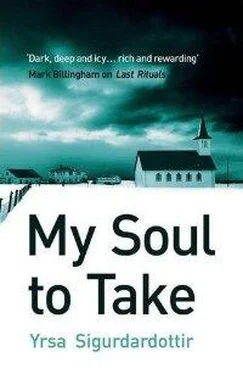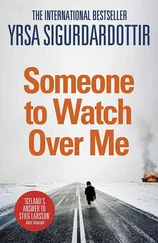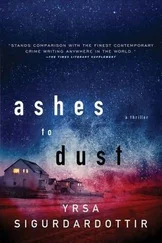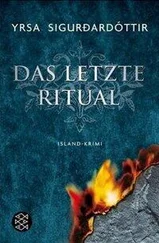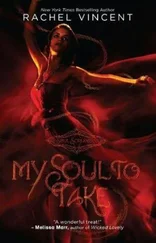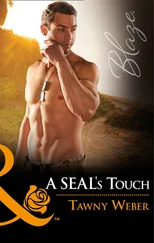Thóra paused, thinking. “Who do you think murdered Birna?” she asked. “You were close; you must have wondered.”
“Jónas,” he snarled. “Who else?”
Thóra shrugged. “He says he’s innocent. Just like you,” she said. “And why would he want her dead? She was working on a project that meant a lot to him. Without her it’ll all fall apart, or at least be seriously delayed. I understand that he’d come to terms with breaking up with her, so he could hardly have been jealous, could he?”
“They were never really together,” said Bergur angrily. “They were having sex, but it was never a relationship.” He paused to catch his breath. “But he missed her terribly, and it’s not true that he’d recovered from the rejection.”
“How do you know?” she asked.
“Birna told me,” said Bergur petulantly. “He was still chasing after her. That’s why she stopped using her hotel room as a studio. He wouldn’t leave her alone and she was unable to get any work done.”
Thóra was agog. “So where did she work?” she asked. “Presumably somewhere close by.”
Bergur could obviously tell that Thóra’s interest was aroused and he took pleasure in drawing out his reply. “She moved over to Kreppa,” he said eventually. “The farm belongs to the hotel, but it’s deserted. She moved her stuff in there.”
“I know the farm,” Thóra replied. “I’ve even been inside, but I saw no evidence that anyone had worked there recently,” she said dubiously. “Do you know which room she used?”
“It was one of the upstairs rooms,” he said, without elaborating.
“I see,” she said, determined to revisit the farm at the first opportunity. Some of Birna’s belongings must still be there, hopefully something that could shed light on her death, although that might be wishful thinking. “Tell me something,” she said. “Do you know the history of the two farms, Kreppa and Kirkjustétt?”
Bergur shook his head. “No,” he said. “I’m from the West Fjords. I didn’t move here until I was about twenty.”
“You never heard mention of a fire at Kirkjustétt?” she asked hopefully, although she knew it was unlikely.
“No, never,” said Bergur. “Apparently the farms are still in their original condition, so there could only have been a fire there if it happened just after they were built and the damage was repaired immediately. I doubt that, though, because Birna was fascinated by those two farms and she never mentioned it to me.”
“Did she discuss their history with you?” asked Thóra. “And did she ever mention Nazis in connection with them?”
Bergur looked startled. “Actually, she did,” he said. “We didn’t talk about it much, but she once asked me if I knew anything about Nazis in the area sometime in the past. Of course I knew nothing, but when I asked her what she meant, she changed the subject and said it didn’t matter. Odd that you should mention it too. I’d forgotten all about it.”
“What about Kristín?” she asked. “Did she ever mention the name Kristín?”
Bergur gave a hollow laugh. “Show me the Icelander who’s never spoken the name Kristín at some time in his life.” He stopped smiling. “But no, I have no particular recollection of her mentioning that name.”
“All right,” Thóra said. “If you don’t mind, I’d like to ask you about Eiríkur, the aura reader.” Not waiting for his response, she went on, “Did you know each other?”
“No,” Bergur replied. “I knew who he was. That was all. I never spoke to him.”
“Can you tell me how you found his body?”
“Don’t you want to see for yourselves?”
Thóra and Matthew stood up and followed him back into the main part of the stables. Accustomed to the smell, Thóra put on a brave face, but Matthew grimaced at her as they left the coffee room. They went up to one of the stalls, which had higher partitions than the others.
“He was in here,” Bergur said, his face pale now. “The stallion was in the stall too, and it had trampled him to death. That’s how it looked to me at least.” He opened the gate to the stall. “The horse isn’t in there now.”
Thóra peered in. There was not much to see now that the floor had been cleared. “Presumably the police have investigated the scene thoroughly?” she asked.
“Yes, they spent the whole night here,” he replied. “It wasn’t a pretty sight.”
“I bet it wasn’t,” Thóra said. “What were you coming in here for?”
“I have to feed them,” he answered brusquely. “Unfortunately.”
“Unfortunately?” she repeated. “What do you mean?”
“I wish I’d never seen it. It was horrible,” the farmer said frankly. “It was an awful sight. The fox, the needles, the blood . . . and that poor man.”
“The fox?” Thóra asked. “There was a fox in here?”
“Yes,” he replied. “Tied to the man’s chest. At first I thought it was a wig; then I realized. I stood here unable to move for ages. I just couldn’t stop staring.” He closed the gate to the stall.
“Why would anyone tie a fox to their chest, or to someone else’s?” Thóra speculated. “Do foxes have any special significance in this part of the country?”
“Not that I know of,” Bergur replied. “I have no idea what it was supposed to mean. Perhaps it was just to make it worse for the poor guy. The smell of the fox was disgusting. It had been dead much longer than he had.”
Thóra nodded, deep in thought. She couldn’t think of a logical explanation. “But what was that about needles? Had the man been injecting himself?” This might explain Thórólfur’s bizarre questions about acupuncture and sewing sets.
Bergur frowned, clearly not enjoying the recollection. He swallowed loudly before speaking. “Pins had been stuck into the soles of his feet.” He hesitated before adding, “The same had been done to Birna.” He shuddered, then continued, “Whoever did that was some kind of monster.”
“Pins?” Thóra asked in astonishment. “Sewing pins?”
“Yes.” Bergur bit his lip. “I’d prefer not to discuss it. I don’t like to think about it too much.”
Thóra let the matter rest, so astounded that she had no idea what to ask next. Why would anyone stick pins into someone’s feet before murdering them? Could Birna and Eiríkur have been tortured to extract information? Thóra abandoned her speculations and changed the subject. “May I ask if you can account for your whereabouts at the time the police think Birna and Eiríkur were murdered?”
“Yes and no,” Bergur said. “I can account for my whereabouts, but I generally go off by myself, so no one can back me up except my wife.” He looked defiantly at Thóra, as if daring her to contradict him. She couldn’t, and thought him much smarter than Jónas, who had fabricated an alibi that was easy to disprove. “She’d never lie to the police,” he added dryly, as if that were a great failing.
“One more thing,” Thóra said quickly. “What does ‘RER’ mean?”
Bergur opened the gate to the stall. “I don’t have a clue what it stands for.” He pointed to the wall. “Eiríkur scratched it on the corrugated iron before he died.”
Thóra went back inside with Matthew in pursuit. After she’d explained what Bergur had been saying, they bent down for a closer look at the scrawling. Matthew took out his mobile to photograph it.
“RER,” Thóra said, following him back out. “Reb?” she said. “ ‘Rebbi’ is a nickname for a fox. Could he have tried to write ‘Rebbi’? That first R could just as easily be a B.”
Bergur shrugged. “I told you—I have no idea.” He closed the stall. “I’ve got to get back indoors. Are we done?”
Читать дальше
